The CHRO’s Team:
What Matters Most

By Marc Effron, Talent Strategy Group, and Jim Shanley, The Shanley Group
The most recent CHRO Trends Report contains a statistic that should alarm CEOs and CHROs alike. That study reported that 47% of CEOs replaced their CHROs with external candidates in 2019. That statistic continues an upward trend from 2018 and it raises questions about which capabilities CEOs find lacking in their company’s existing HR talent. If that trend continues through 2020, then 2021 will be the first year when more CHROs are replaced with external candidates than with internal ones.
What’s Behind The Trend
The past 20 years have seen remarkable improvements in the quality and influence of CHROs. These new leaders have increased the power and impact of the HR profession and elevated critical topics including talent, diversity, and engagement to the executive agenda. They have become trusted advisors to the CEO and board and a true partner to the executive team.
Many of these CHROs have changed their company’s HR structure and technology rightsized their group and reduced costs. These cumulative changes have elevated HR’s profile and influence and sharply reduced the “noise” historically caused by poor quality interactions between HR and the business.
These positive changes are offset by an area in which we see significantly less change – the quality of the CHRO’s team. Even CHROs who have aggressively upgraded other elements of their organization have hesitated to make the often-obvious talent changes needed in their direct reports.
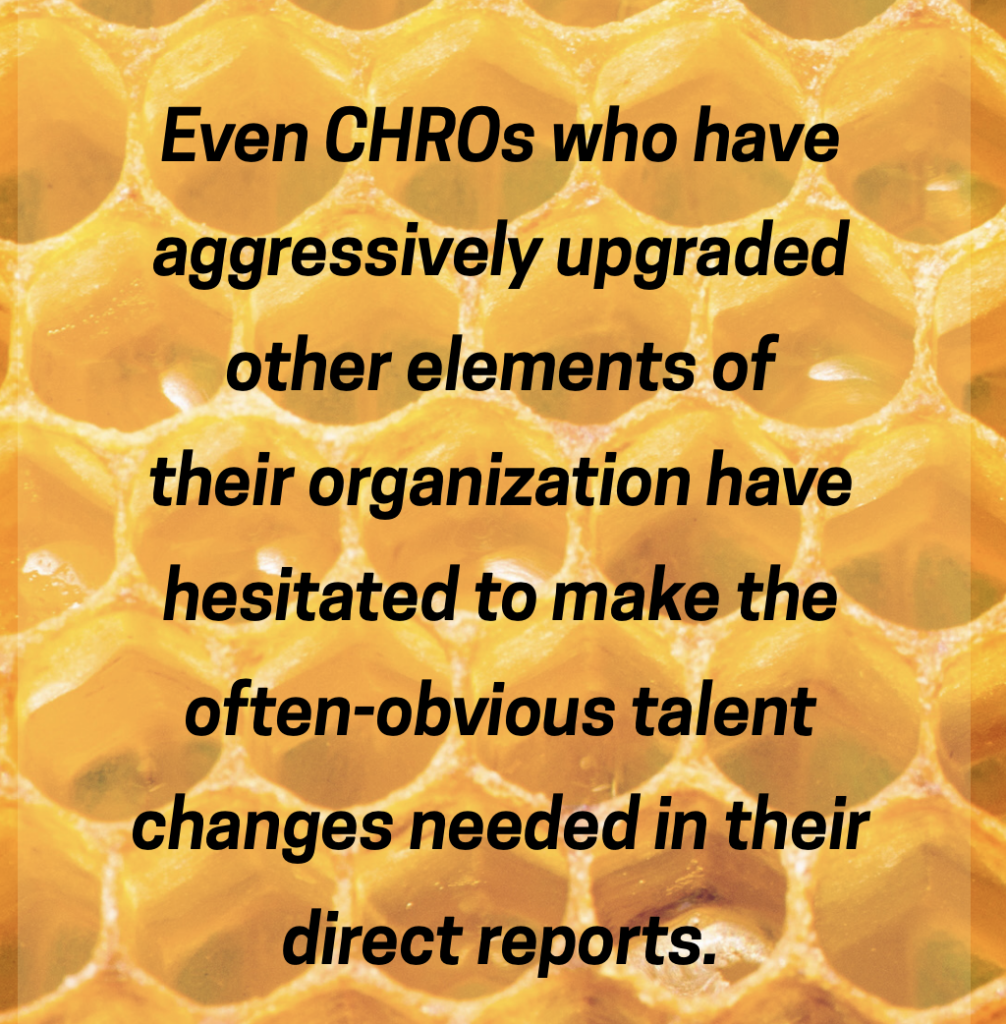
We believe that CHROs’ delay in upgrading the quality of their team partially explains why more CEOs are hiring unknown CHRO successors. It also suggests that CHROs must elevate their team quality as the necessary next step to complete their HR transformation.
Do You Have an All-Star CHRO Team?
As a CHRO, you may believe that your HR team already performs at a high level. We hope they do, but we would like to hear your answers to three questions:
- Would your company’s best leaders and employees say that your core HR processes are flawlessly executed, easy to use, and getting the results that top executives and employees need and want?
- Are your team members able to influence top executives on difficult topics, changing the executive’s mind where needed through a deep understanding of the business and strong command of the relevant facts? And, perhaps most importantly,
- Does the executive team trust your direct reports with their corporate lives?
If you can affirmatively answer each of those questions, you’ve built an outstanding CHRO team and your CEO should be thrilled with your deep succession chart.
A typical CHRO’s response to those questions ranges from “sort of” to “we’re still working on that.” When we ask about the specific plan to elevate the quality of their team, there is none.
It’s that inattention to the quality of the CHRO’s team that creates destructive friction between the CHRO and her or his CEO. As CHRO, your team’s mindset, capabilities, and performance reflect, fairly or not, on your competence. We’ve known many smart, highly capable CHROs who were personally strong but who were let go because their team was not designed to, and/or had no capability to, deliver high performance.
The CHRO’s Team: What Matters Most
Our experience shows that three factors differentiate the members of a high performing CHRO team:
- A High Performer’s Mindset
- Capability Built through Experiences
- Executive Advisor and Influencer
Those factors might not seem especially differentiating, yet we’ve found extraordinarily few HR leaders who meet them as we define them below.
1. High Performer’s Mindset
The starting point for a strong CHRO team is the team members’ belief about what underlies their individual success. We call this belief the High Performers Mindset and it means that your team members:
- Work harder than others: At some point, high performance depends on the number of hours worked and no amount of “working smart” can make up for the benefits of additional time spent on projects, relationships, learning, and other competence-building activities. This doesn’t require an 80-hour workweek, but it suggests that a 40-hour week isn’t sufficient to deliver high performance.
- Make additional sacrifices: High performing HR leaders understand that high-profile projects may require more personal sacrifice and less flexibility in their role. When business travel becomes normal again, leaders may not see their family as much as they would prefer to. Even without travel, they may often need to give up part of their weekend or frequently participate in meetings at odd hours.
- Embrace relative performance: Members of a high performing CHRO’s team recognize that their contributions will be always compared to other’s contributions inside and outside the organization. They recognize that being the best player on “Team 1” might only make them an average player on “Team 2.” Fortunately, teams have room for many stars as long as everyone performs at an extraordinarily high level.
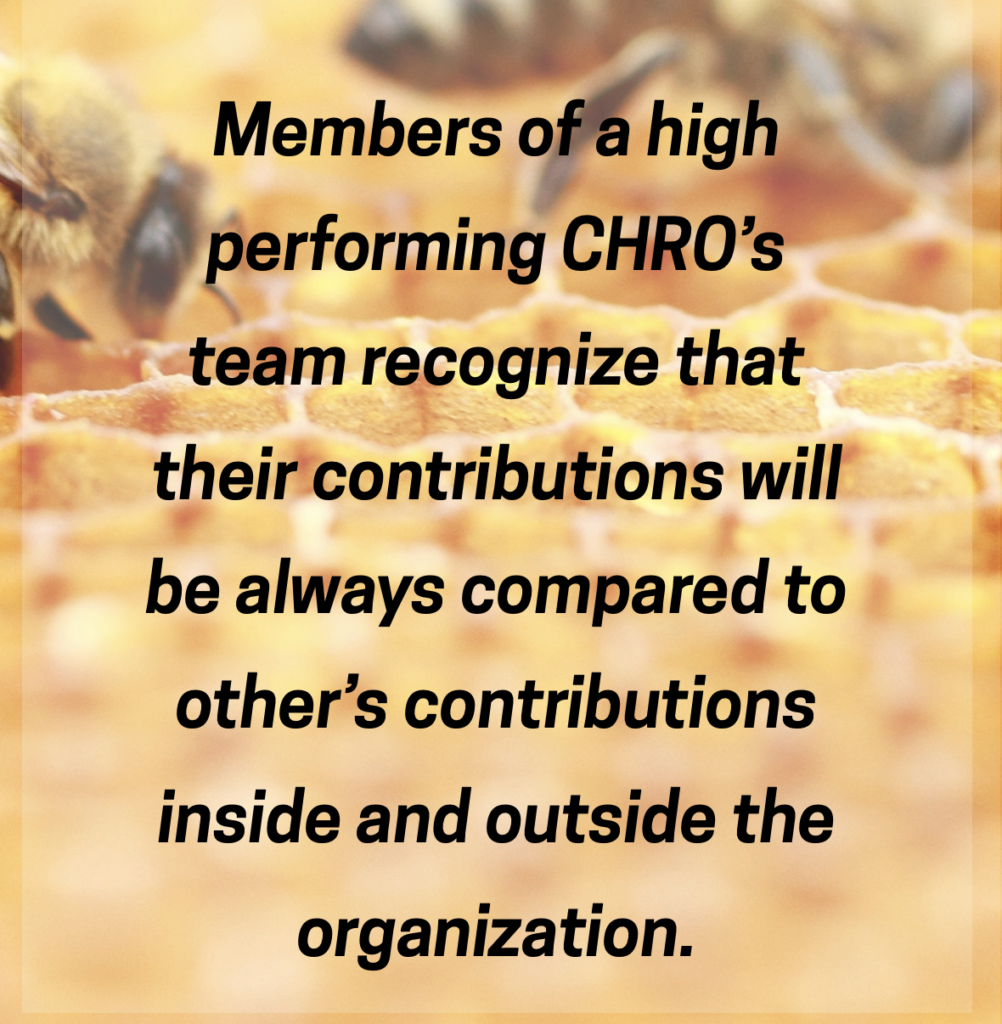
A high performer’s mindset raises the standard for HR leaders and eliminates many of them who are unable or unwilling to meet that standard.
2. Capability Built Through Experiences
If we believe that competence is built through experiences, we should want HR leaders to have many, diverse experiences and the functional depth and breadth those experiences build.
Some key questions that will test if your team has built those capabilities include:
- HR depth and breadth: In how many areas of HR have they had extremely high-quality experiences? What is their ability to build simple, effective processes in compensation, talent acquisition, and talent management? How comfortable are they with HR analytics and turning data into a compelling story?
- Learning agility: Are they able to learn from their experiences? Can they perform at a high level in new and first-time situations? Do they figure out what to do when they don’t know what to do?
3. Executive Advisor and Influencer
There’s a clear line between those who know HR and those who excel at HR. The latter is considered a trusted voice by the executive team and board on the most important organizational and strategic issues. They can advance their HR agenda with ease because they thoroughly understand the business and its talent and have built strong executive relationships.
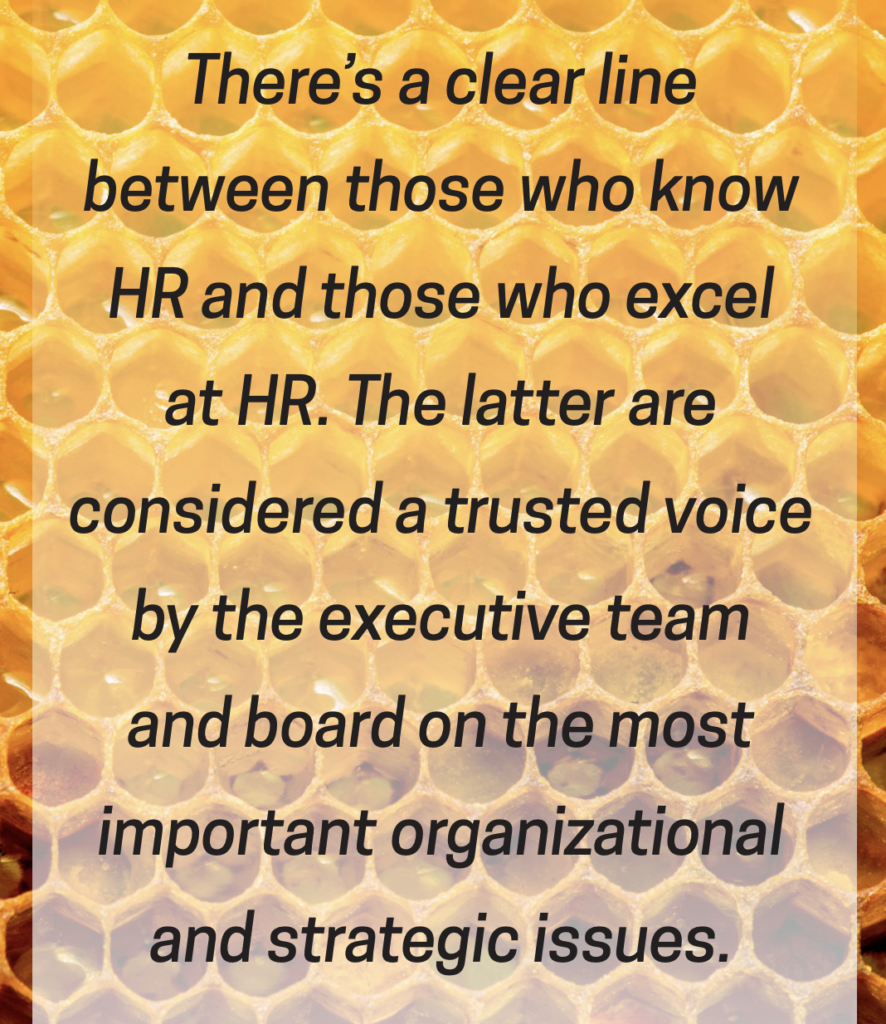
An HR leader’s capability to be an executive advisor and influencer is defined by six capabilities:
- Practical business acumen: How well does your team understand your company’s finances, operations, markets, and customers at a practical level? A student in our Talent Management Institute recently provided a perfect example of practical business acumen. She had previously worked for a global beverage company and spoke about a key benefit of her accompanying delivery drivers on their routes. She told us, “Because of that experience, I knew the profit margin of every case of soda we delivered. So, every time someone proposed an HR initiative, I would ask myself, how many additional cases of soda will we have to sell to pay for this?”
- Trusted Advisor: Are they seen by their executive team member or the executive team in general as incredibly valuable counsel on the most important organizational issues? Are they the first person that executive calls when they want high-quality insights and advice?
- Courageous Advocate: Do they have a fact-based, logical, and well-structured point of view about how to manage talent for peak company performance? To what extent are they willing to strongly advocate for that point of view, even when their client strongly disagrees?
- Talent Authority: At what level of depth do your CHRO team members know the talent one and two layers below their client? For COE leaders, how well do they know the top 100 leaders in the business? Can they tell you each leader’s strengths, weaknesses, key development action, and best next move?
- Strategist: Can they translate from the company’s business strategy to a prioritized HR strategy with specific actions?
- Social architect: Can they architect and drive a senior leader’s change agenda and help her drive growth & innovation?
Those three factors, and the elements below them, clearly separate those who will thrive on a top CHRO’s team from other HR leaders. The question for you as a CHRO is how you can accurately assess those factors.
Assess for CHRO Team Excellence
When we help CHRO’s redesign their organization, we often assess their HR team’s capabilities. We use two tactics to better understand the team’s current capabilities and future potential to demonstrate A High Performer’s Mindset, Capability Built through Experiences, and is an Executive Advisor and Influencer.
1. Conduct an Experience Interview
We meet with each CHRO team member to discuss their background, experiences, personal drivers, approach to their role, business knowledge, and mindset. This is a wide-ranging 90-minute interview that provides an incredibly rich amount of information.
We listen for how they talk about the business, their clients, their role, their desired impact, the company culture, and more.
2. Conduct a Hogan Assessment Suite
The Experience Interview tells a compelling story about the current state of the HR leader and their path to this point.
The Hogan Assessment suite provides valuable insights that help us predict how that leader will behave and present themselves in future roles. These personality-based insights tell us about potential derailing behaviors, the leader’s fit with the future needs of the business, and how executives will likely perceive them.
We integrate our findings from both assessments into group and individual summaries (See Figures #1 and #2). The group summaries provide compelling visual evidence of high and low capabilities in the group. For example, Figure 1 shows a CHRO team that is generally weak across capabilities, with specific holes in their ability to advance tough issues, build strategy, and manage talent.
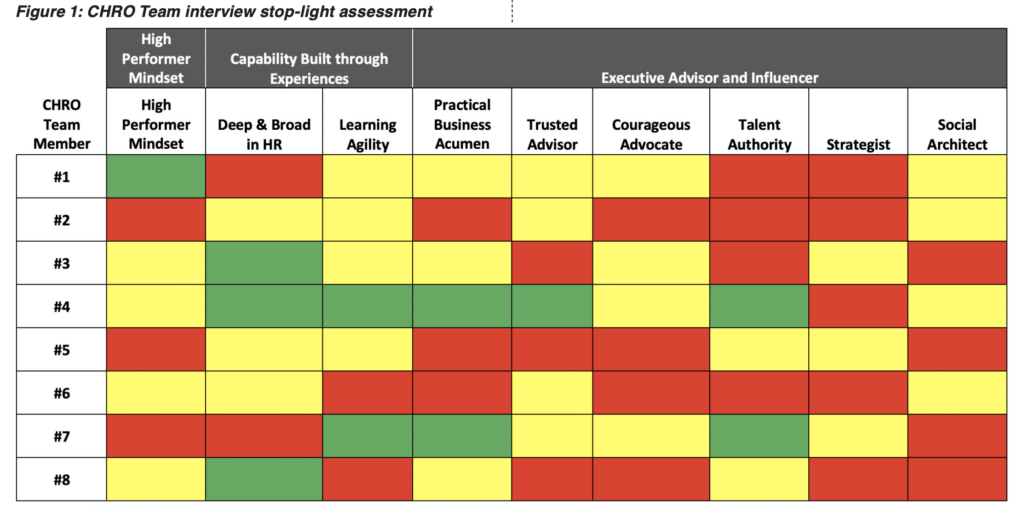
A one-page individual report is prepared for each CHRO team member. More often than not, these assessments confirm the CHRO’s feelings about their team. They are often the catalyst they need to invest in or make changes to their group.
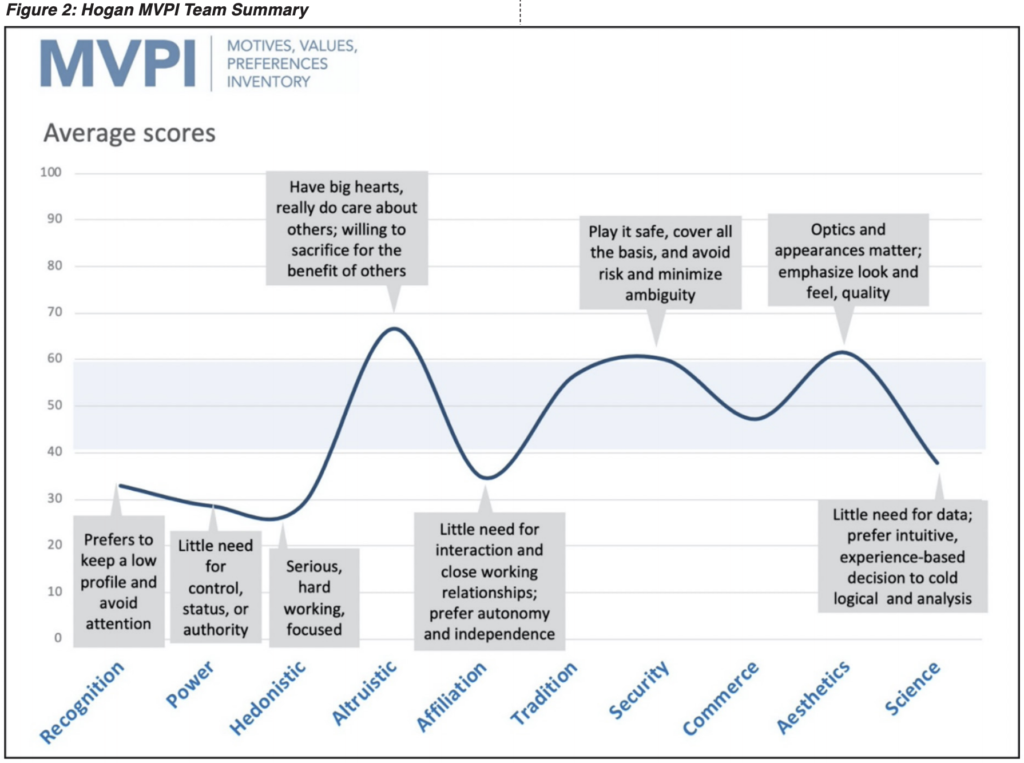
What Our Assessments Find
Our findings from CHRO team assessments across large organizations show a clear pattern. CHRO teams are mixed in their High Performers Mindset with a higher percentage of HRBP’s endorsing that mindset than COE leaders. On Capability Built through Experiences, many CHRO team members have deep and broad HR experience with a reasonable amount of learning agility.
Where there is not the strength (or there is significant variability) in a typical CHRO team is in the ability to be an Executive Advisor and Influencer. We find weakness across the dimensions with specific gaps in being a Courageous Advocate, Talent Authority, and Strategist.
It’s also rare to find a true Social Architect – someone who can holistically conceptualize what the Senior Executive is trying to create, work with the executive team to enlist sustaining sponsors and drive their leader’s change agenda in a manner to ensure that the change sticks.
Where that leaves many CHRO teams is with committed HR technical experts who want to work hard but who don’t possess the ability to advance a strategic agenda. They are strong at HR delivery and know their craft but don’t have the capabilities to step into the CHRO role.
Elevating The CHRO Team
CHRO’s have meaningfully elevated the importance and impact of their role over the past 20 years. They must now rely less on their personal strength and more on their ability to build high-quality teams in order to sustain their progress.
The fact that CEOs are replacing their CHROs with external candidates indicates that they want top talent in the role but that they aren’t going to patiently wait for the CHRO to build better talent.
CHROs need to assess their teams on their High Performer’s Mindset, their Capability Built through Experiences, and their ability to be an Executive Advisor and Influencer. Many of these capabilities can be developed in your team members and, if they can’t, you’ll have objective data to help you make smart choices.
Five Questions The CHRO Should Ask Themselves About Their Team
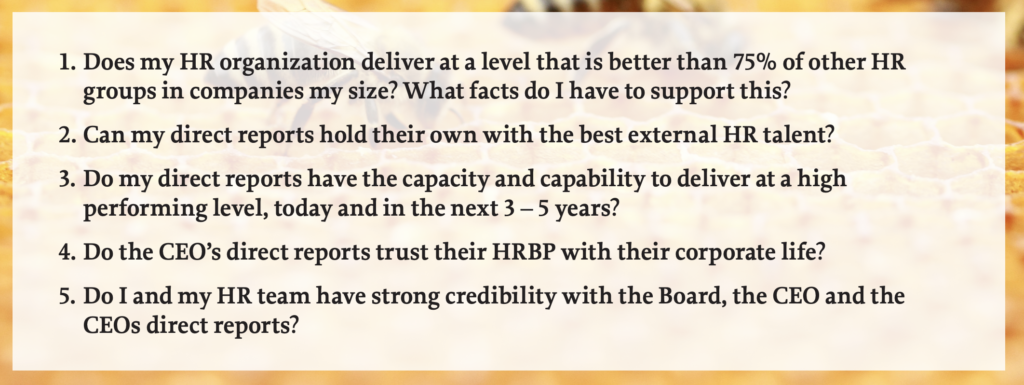
1) https://talentstrategygroup.com/chro-trends-2020/
More About The Author:
- Marc Effron, President, Talent Strategy Group
- Marc founded and leads The Talent Strategy Group and consults globally to the world’s largest and most successful corporations. He co-founded the Talent Management Institute and created and publishes TalentQ magazine. He co-authored the Harvard Business Review Publishing best-seller One Page Talent Management and 8 Steps to High Performance.